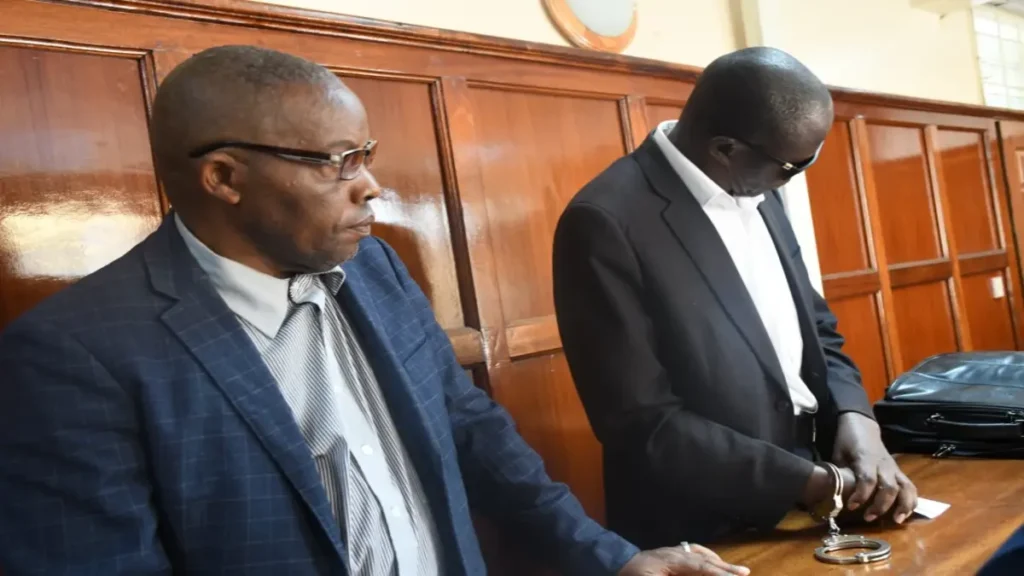A landmark ruling that has signalled Kenya’s renewed fight against corruption, Hendrick Nyongesa, the former Head of Procurement at the National Youth Service (NYS), will spend the next seven years behind bars for playing a role in a staggering Ksh791 million fraud case.

Hendrick Nyongesa Pilisi and Samuel Wachenje were jailed for conspiring to defraud NYS of Ksh.791 million in 2015.courtesy photo
The Anti-Corruption Court handed down the verdict yesterday, dealing a significant blow to corruption in public service. Nyongesa’s accomplice, Samuel Wachenje, who served as the Director of Finance, received a five-year prison term for similar offences.
Both former officials faced charges of creating false documents and breaching public trust during their tenure at the youth service organisation. The court ordered the sentences to run concurrently, with no option for the convicts to pay fines instead of serving jail time.
The prosecution successfully proved that between December 2014 and June 2015, Nyongesa and Wachenje orchestrated a sophisticated scheme to process fraudulent payments, leading to massive losses at the state corporation.
“This ruling sends a clear message to all public servants that corruption will not be tolerated,” said the presiding magistrate while delivering the judgment. “The evidence presented before this court clearly shows a deliberate effort to defraud taxpayers through elaborate schemes.”
During the trial, the prosecution revealed how the two officials abused their positions of trust to authorise suspicious payments. Nyongesa, as the head of procurement, played a crucial role in initiating these transactions, while Wachenje used his position as finance director to approve the fraudulent payments.
The investigation uncovered a complex web of financial misconduct that stretched over six months. The officials manipulated internal systems and created false documentation to facilitate the theft of public funds meant for youth development programmes.
“The magnitude of this fraud has severely impacted the National Youth Service’s ability to deliver on its mandate,” explained a senior investigator who worked on the case. “These funds could have supported thousands of young Kenyans through various training and employment programmes.”
The case has drawn significant public attention since it began, highlighting the ongoing challenges Kenya faces in its fight against corruption in public institutions. Anti-corruption activists have welcomed the ruling, seeing it as a positive step towards accountability in public service.
“This conviction demonstrates that no one is above the law,” said James Kimani, director of a local anti-corruption watchdog. “We hope this will deter other public servants who might be tempted to engage in similar practices.”
The impact of the fraud on NYS operations has been substantial. The organisation, which aims to train and empower young Kenyans through various programmes, had to scale back several initiatives due to the financial loss. Many youth projects ground to a halt, affecting thousands of beneficiaries across the country.
Community leaders in areas where NYS operates have expressed relief at the verdict. “Our young people have suffered because of these corrupt officials,” said Mary Wangari, a youth mentor in Nairobi. “This judgment gives us hope that things will improve.”
The case has also sparked renewed calls for stronger oversight mechanisms in public institutions. Anti-corruption experts argue that while the conviction is commendable, more preventive measures are necessary to protect public funds from misuse.
“We need to strengthen our systems to prevent such massive fraud from occurring in the first place,” suggested Dr Peter Ouko, a governance expert at a local university. “Regular audits and better monitoring systems could help detect suspicious activities earlier.”
The Ethics and Anti-Corruption Commission (EACC) has pledged to continue its crackdown on corruption in public institutions. “This conviction proves that our investigative and prosecutorial processes are working,” said an EACC spokesperson. “We will pursue all cases of corruption with equal vigour.”
As Nyongesa and Wachenje begin their prison terms, the focus now shifts to recovering the stolen funds. Authorities have launched proceedings to trace and seize assets linked to the fraud, hoping to recover at least part of the lost money.
The NYS case joins a growing list of high-profile corruption convictions in Kenya, suggesting a possible turning point in the country’s anti-corruption efforts. However, experts caution that sustained effort will be needed to eliminate endemic corruption in public institutions.
Meanwhile, the National Youth Service has implemented new financial controls and management systems to prevent similar incidents in the future. The organisation’s current leadership has promised transparency and accountability in all its operations.
As the dust settles on this landmark case, the message is clear: corruption in public service carries serious consequences. The conviction of these senior officials marks an important milestone in Kenya’s ongoing battle against corruption and misuse of public resources.



















